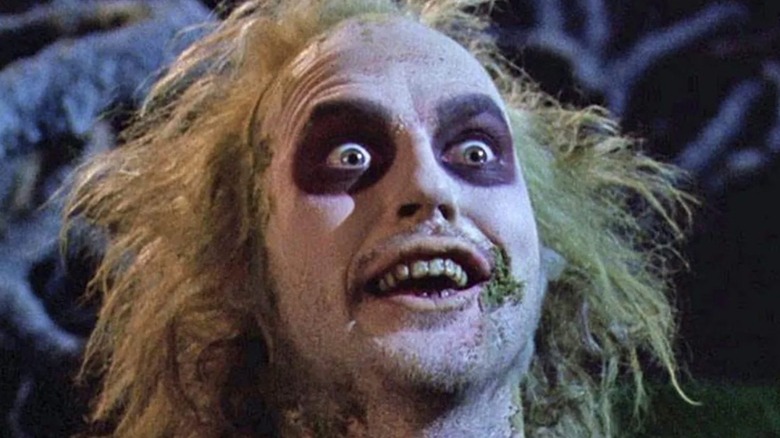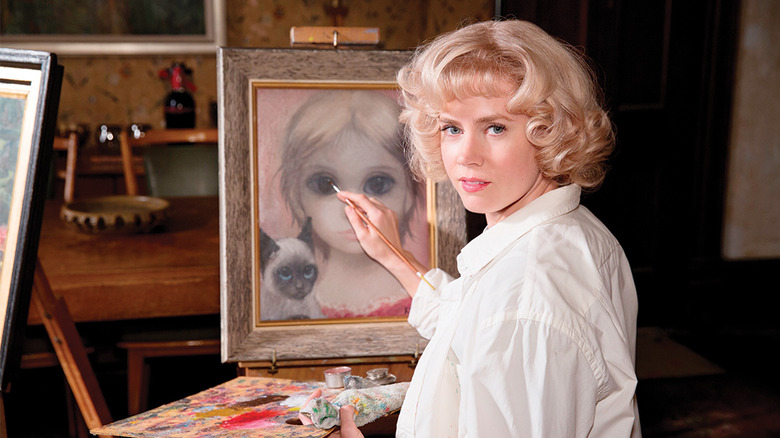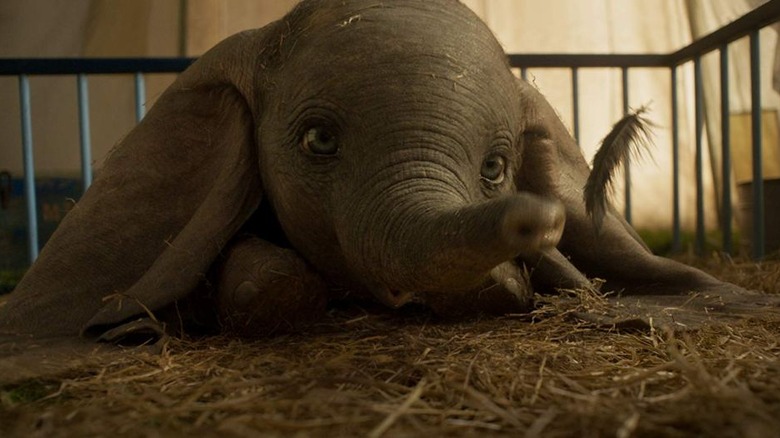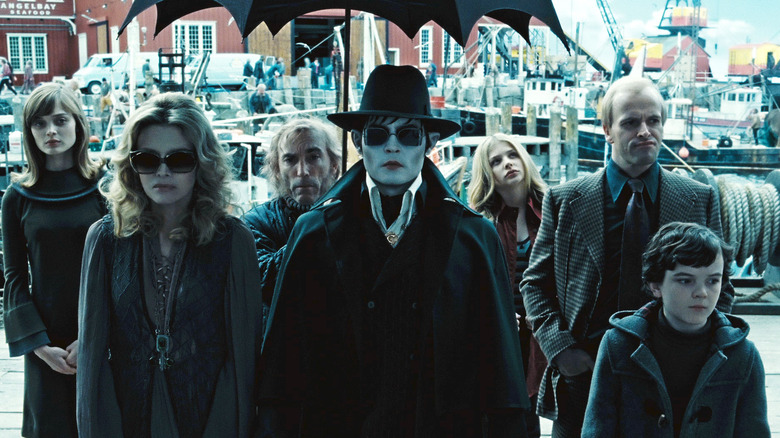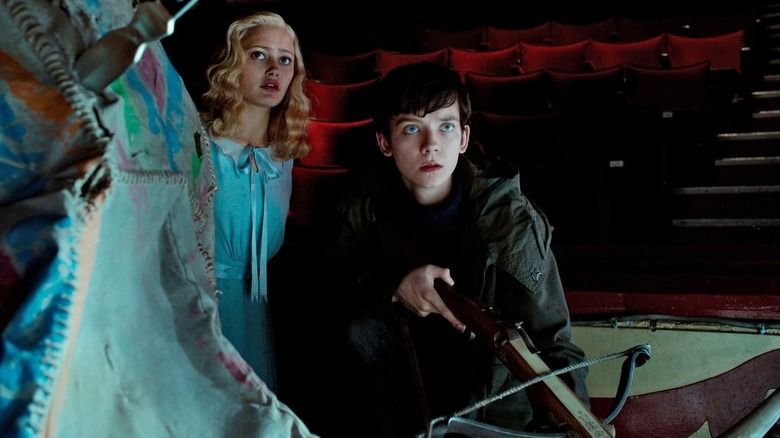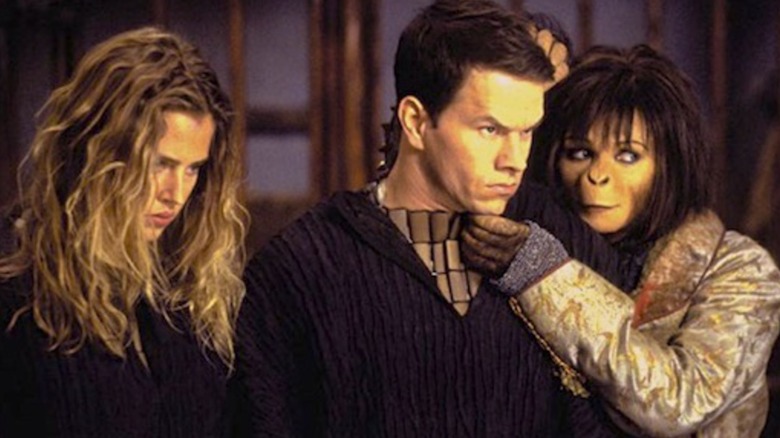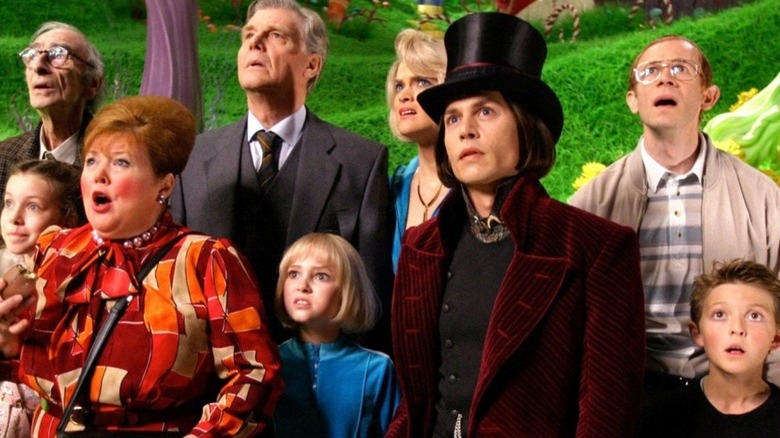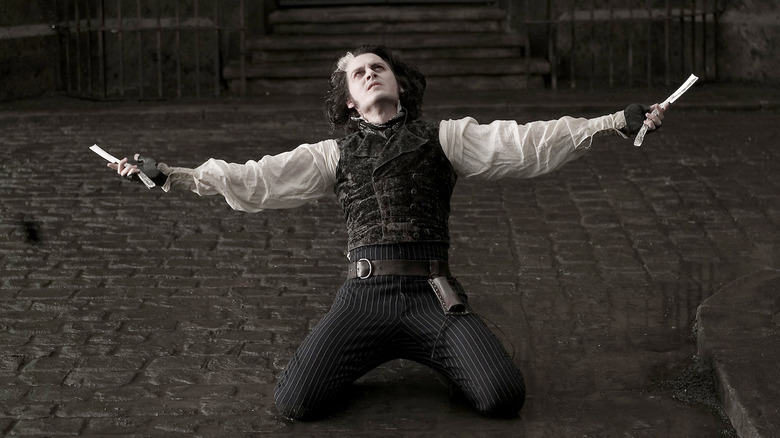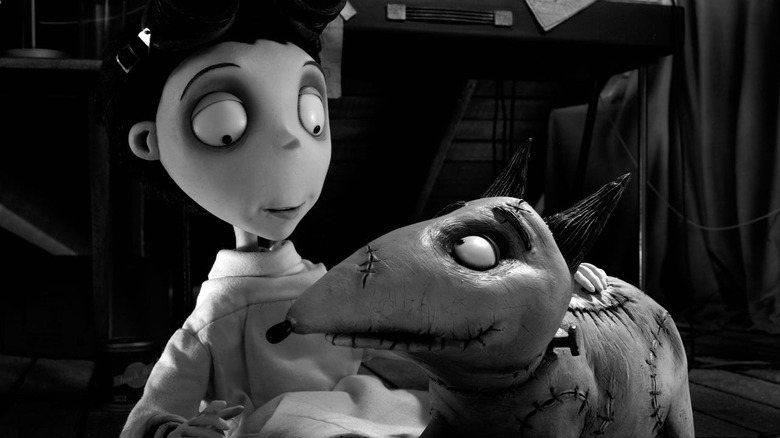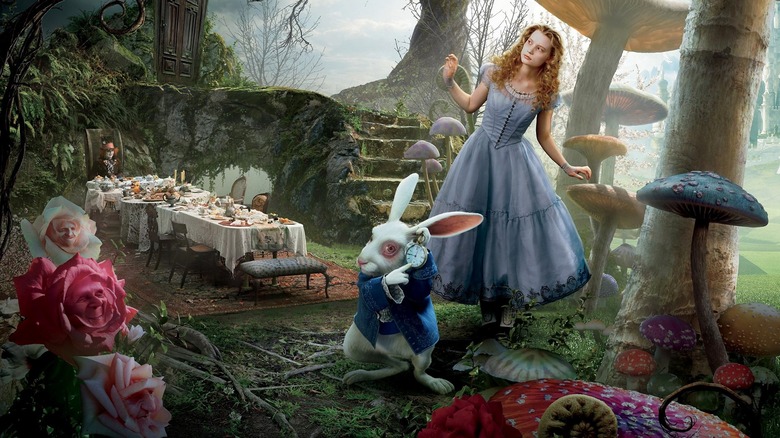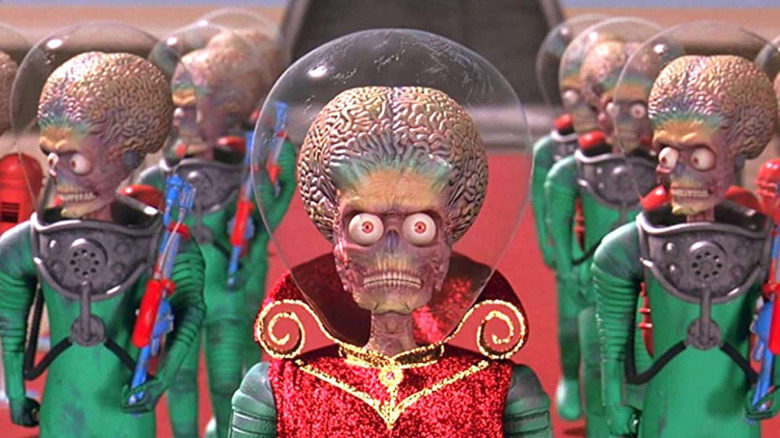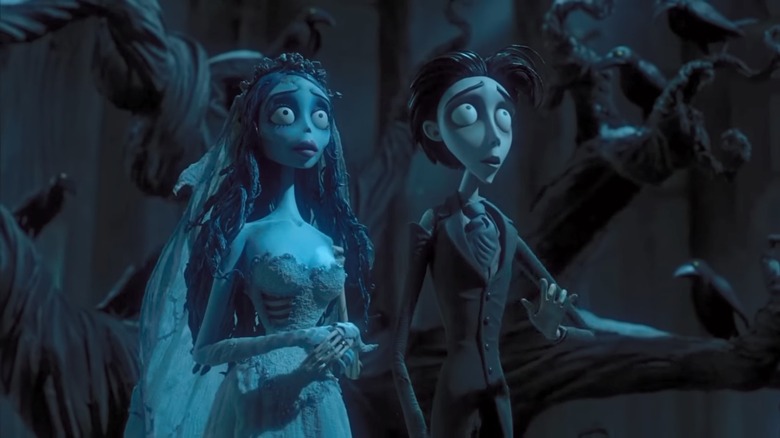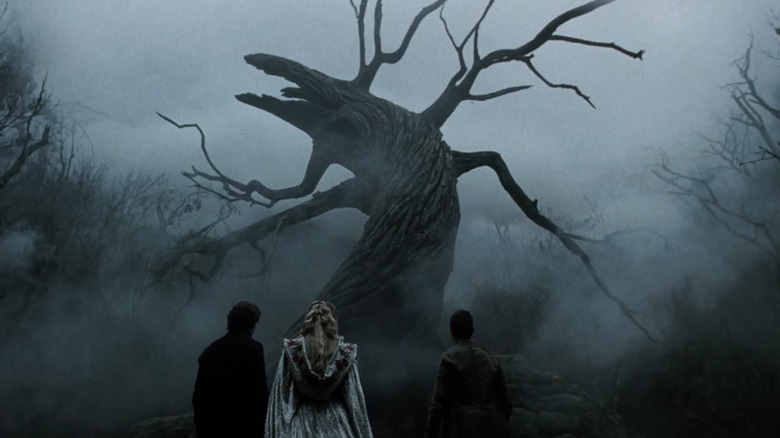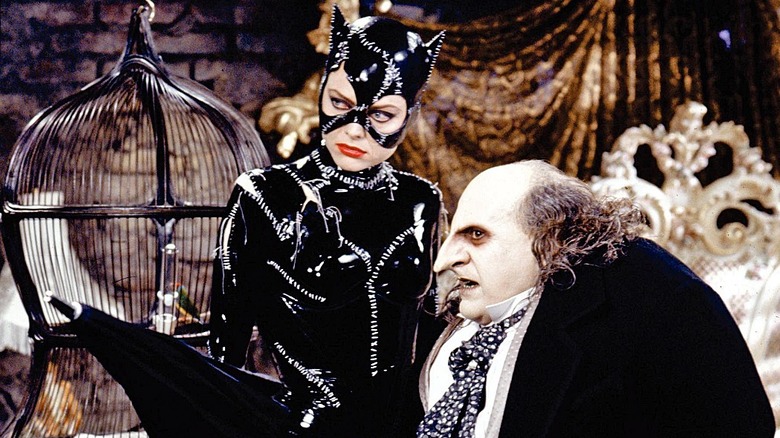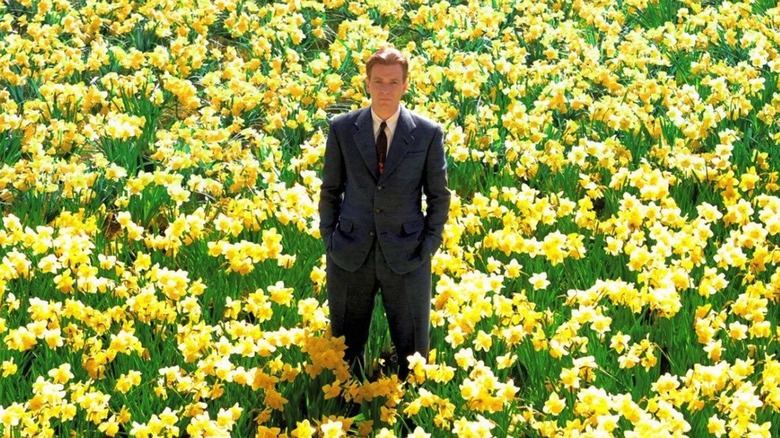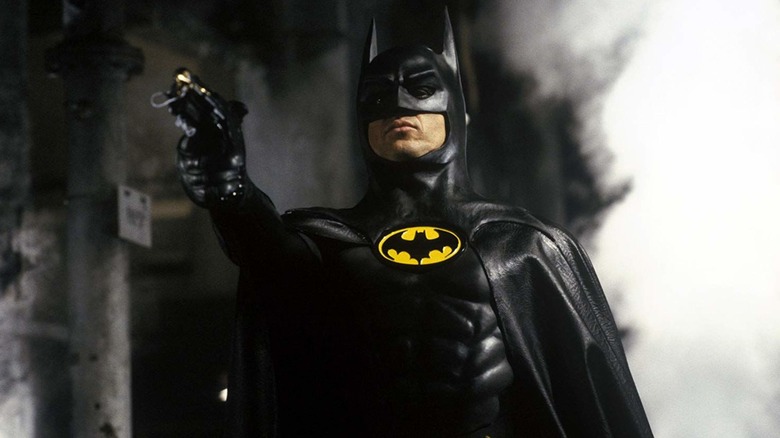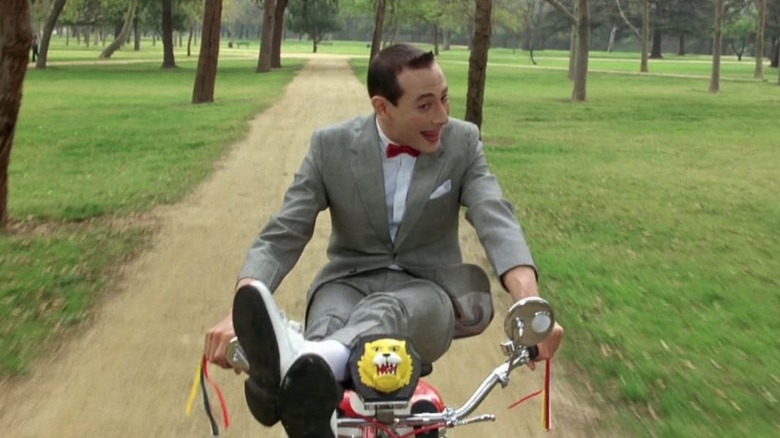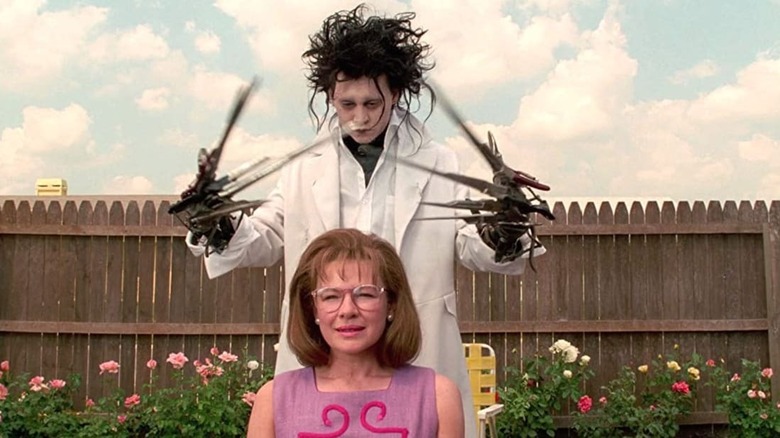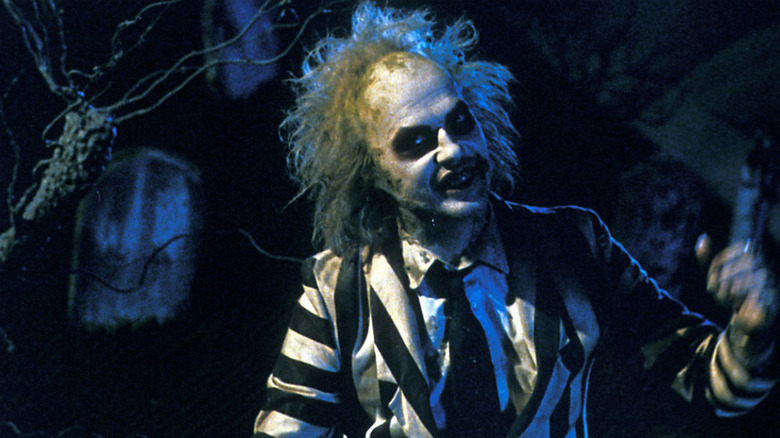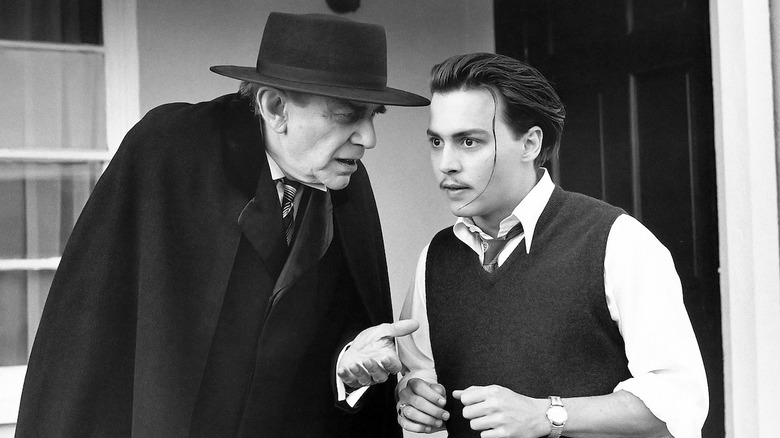Every Tim Burton Film Ranked From Worst To Best
Few careers in Hollywood seem as stable, yet somehow still wild, as Tim Burton's. One of the premier genre filmmakers since the '80s, Burton has created some of the most iconic and enduring movies of the last few decades. He has also, perhaps, relied on his keen sense of style at the expense of his stories, leading to a run of films that are beautiful to look at but emotionally empty.
When Burton is at his best, his films are bright, creative, imaginative, and almost magical. However, although all of his movies all have a uniquely Burton-esque aesthetic, their quality is less uniform. Still, it's hard to begrudge a filmmaker who is so steadfast in his approach to production design and loyal to the actors he's developed a relationship with. When you see a Tim Burton film, you tend to know what you're in store for – for better and for worse.
19. Big Eyes (2014)
The title says it all, doesn't it? The eyes are too big.
"Big Eyes" is the biographical story of a husband (Christoph Waltz, in proper baddie form) who is famous for painting portraits of figures with exaggeratedly large eyes. He's also a fraud; his wife (Amy Adams) is the one who does the painting. It's a remarkable true story, one that highlights how men take credit for women's achievements, a trend that is all too common throughout history.
"Big Eyes" did reasonably well at the box office, and received a tepid but generally positive response from critics. The performances from Waltz and Adams are strong — Adams even won a Golden Globe for her performance — although the film's pacing and tone are a little uneven. There's nothing really wrong with it, yet "Big Eyes" failed to connect with audiences across the board. Why? Honestly, it's probably the eyes. They're just creepy.
18. Dumbo (2019)
Tim Burton has probably encountered the question, "Does this adaptation or remake really need to exist?" several times during the course of his career. With "Dumbo," whoever was asking had a point. The animation in the original "Dumbo" is so iconic, so memorable, and so beloved that it doesn't seem worth it to try to recreate it in live action.
"Dumbo," of course, is the story of a young elephant with giant ears that give him the ability to fly who is traumatically separated from his mother. That is, perhaps, part of the problem. "Dumbo" is a deeply upsetting, just plain sad movie. Burton can do bittersweet and he can do melancholy, but he seems to struggle to do sad — tinges of playfulness undermine the story. It certainly doesn't help that "Dumbo" is one of the last in a long line of live-action Disney remakes, each less novel and more tiresome than the last.
17. Dark Shadows (2012)
"Dark Shadows" is nothing less than an icon of mid-century television. It began airing in 1966 and ran for an impressive 1225 episodes, becoming one of the first soap operas to embrace genre storytelling while capturing the attention of a generation of viewers. Initially dominated by plots surrounding the wealthy but unstable Collins clan, "Dark Shadows" grew incredibly popular once Barnabas Collins, a vampire returning home after 200 years stuck in a coffin, appeared on the series.
Alongside "The Munsters" and "The Addams Family," "Dark Shadows" ranks pretty high on the list of television shows that seem like they're firmly in Tim Burton's wheelhouse. But when Burton was finally made the film, which stars Johnny Depp and Eva Green, it underwhelmed audiences. Perhaps because the series was built from literally over 1,000 different storylines, Burton found it difficult to construct a cohesive narrative beyond the central fish-out-of-water concept. BWhatever the reason, this was a turning point, showing that audiences were beginning to sour on Burton and Depp's frequent collaborations.
16. Miss Peregrine's Home for Peculiar Children (2016)
When the novel "Miss Peregrine's Home for Peculiar Children" first came out, it immediately grabbed readers' attention with its strange and unsettling historical-looking photographs of children with unusual powers. It also happens to be one of those stories that relies on aesthetics instead of a coherent plot. That makes "Miss Peregrine's Home" the type of film that would naturally appeal to Tim Burton, but also exposes his own shortcomings as a director, as he tends to focus on the visuals and at the expense of everything else.
"Miss Peregrine's Home for Peculiar Children" involves a home for children with special abilities, who are kept in a time bubble to protect them from nefarious forces that would do them harm. It's an intriguing idea with a lot of potential, but it sort of fizzles out without making much of an impression (although, to be fair, two hours watching Eva Green at her most eccentric are two hours well spent).
15. Planet of the Apes (2001)
Right off the bat, "Planet of the Apes" represents quite a challenge for Burton. He has some mighty big shoes to fill: The original version, starring Charlton Heston, is almost universally beloved. Unlike some of the other properties that Burton has adapted, there's limited room for the director to put his own personal touch on things, and it almost feels as though he's intimidated by his first foray into action blockbuster filmmaking.
Aside from the makeup, which is remarkable, and delightful performances from Helena Bonham Carter and Tim Roth, there's little to recommend about "Planet of the Apes." When Burton adapted "Batman" he was taking on a similarly well-known story, but found ways to be inspired by it. Here, he just seems to get lost. As much as some people may complain that Burton's signature sense of style has grown stale, it is undoubtedly missed when it isn't there.
14. Charlie and the Chocolate Factory (2005)
The original film adaptation of "Charlie and the Chocolate Factory," which came out in 1971 and starred Gene Wilder, may have made author Roald Dahl furious, but it was beloved by audiences. Still, after 30-odd years, Tim Burton and company decided that the time was ripe for a new version.
What followed was nothing less than a bad acid trip, taking the story of a poor boy who, against all odds, wins a golden ticket to a tour through a fanciful chocolate factory, and ratcheting the already extreme sensory overload up about a thousand degrees. Burton also lets Depp completely off his leash, giving him free reign to make his interpretation of Willy Wonka as strange and off-putting as he wants.
The result is an entirely self-indulgent performance, and one that repositions Wonka as the center of attention, when he's supposed to take a backseat to Charlie's narrative. Wilder's Wonka was an oddball, but he also projected warmth and empathy, even when playing the disinterested host. Depp, on the other hand, builds a chocolatier who is cold and too alien to connect with any of the other characters. And no matter the visual spectacle, it can't compensate for an utterly soulless Willy Wonka.
13. Sweeney Todd: The Demon Barber of Fleet Street (2007)
Let's spare a quick moment for all the people who went to see "Sweeney Todd: The Demon Barber of Fleet Street" in theaters and didn't realize until they got there that it was a musical. And not just any musical, but one by Stephen Sondheim, the writer of some of Broadway's most challenging and least catchy songs.
The story of a barber (Johnny Depp) falsely imprisoned for a decade and a half after his beautiful wife caught the eye of a lascivious magistrate is just the beginning of the tragedy in "Sweeney Todd." Vowing revenge on the men in power who ruined his life, Todd goes on a murder spree, cutting their throats and having his co-conspirator Mrs. Lovett (Helena Bonham Carter) bake them into the best pies in London.
Tim Burton's unique visual style is a good match for this gruesome musical, and Depp and Bonham Carter have lots of fun running amok in their Victorian hellscape. Still, neither is able to properly do justice to Sondheim's music, which is difficult even for classically trained singers. And at the end of the day, "Sweeny Todd" is a movie musical about cooking people into pies — it was always going to have limited appeal.
12. Frankenweenie (2012)
"Frankenweenie" has to be one of Tim Burton's most personal projects. Long before he released the 2012 version of "Frankenweenie," he brought it to life as a short, filming it in live-action in the '80s while working for Disney. In fact, Disney fired him over "Frankenweenie," claiming that he was wasting too much money on a film that was inappropriate for children. Burton would have the last laugh, though — Paul Reubens saw "Frankenweenie" and liked the oddball film so much that he chose Burton to direct "Pee-Wee's Big Adventure," which launched Burton's career.
Anyway, it was with a certain sense of triumph that Burton revisited "Frankenweenie" in 2012. The film, about a boy who attempts to use electricity to bring his beloved dog back to life, is a loving homage to the Universal Frankenstein films from the '30s. Although dark in both mood and color palette, the loving bond at the center of the film makes it a sweet and engaging story.
11. Alice in Wonderland (2010)
"Alice in Wonderland," written by Lewis Carroll, is the classic children's novel best-suited to Tim Burton's particular talents. As Alice finds herself falling down the rabbit hole and into a strange new world, she is continually wrong-footed by everyone and everything she encounters.
This is where Burton excels. In his hands, the world of Wonderland is a sumptuous visual feast, every bit as chaotic and bizarre as even the most imaginative child could dream up. The costumes, the makeup, and the set design all work together in perfect harmony (or disharmony, really) to create an environment that is equal parts charming and wildly disconcerting. It's a sensory overload in the best possible way, with each new and exciting character wreaking havoc on Alice's sense of reality. And amidst all of Burton's over-the-top design choices, this adaptation of "Alice in Wonderland" may be the most faithful to the spirit of the original work.
10. Mars Attacks! (1996)
In almost every conceivable way, "Mars Attacks!" is a significant departure from the sort of films that Tim Burton usually makes. Up until this point, he hadn't really dipped a toe into the world of science fiction. But here, Burton creates a purposefully cheesy space epic, as Martians invade Earth with catastrophic effect.
"Mars Attacks!" was released just a few short years after "Ed Wood," and it's clearly an homage to the schlocky '50s science fiction films that Wood was famous for. But it was also released the same year as "Independence Day," which drew unhelpful comparisons from viewers who weren't necessarily in on the joke. "Mars Attacks!" is a very silly movie, but it's also an endearing one, and although it didn't set the box office on fire when it first came out, its reputation has grown in hindsight — it's now considered by many a cult classic.
9. Corpse Bride (2005)
Whenever Tim Burton deviates from tradition, experimenting with bright color palettes and sunshine, he always gives off a sense that he's longing to return to the shadows. "Corpse Bride" may not be Burton's most famous film or his most critically acclaimed one, but it might be the most Burton-y Tim Burton film there is.
Naturally, such a film could not be made without Burton's old stalwarts, Johnny Depp and Helena Bonham Carter. Depp plays Victor, a mild-mannered man on the cusp of wedding his beloved Victoria, when he accidentally marries a dead woman named Emily who holds him to his vows and steals him away to the underworld. The dark, angular stop-motion animation is a technical marvel, and serves as a perfect complement to the spooky narrative, which balances horror, fantasy, and romance in a way that only Tim Burton can.
8. Sleepy Hollow (1999)
"The Legend of Sleepy Hollow," written by Washington Irving in 1820, is one of the first pieces of distinctly American horror. It tells the story of the ill-fated schoolteacher Ichabod Crane and his tragic encounter with the Headless Horseman. It's a piece that has reverberated through the centuries, but poses a challenge for anyone attempting to make it into a feature-length film: Irving's "Sleepy Hollow" is only about 24 pages long, little more than a tale to be told around a campfire.
Still, the original text possesses many qualities typical of Tim Burton projects, especially a powerful yet quirky sense of the macabre. No wonder Burton found this film difficult to resist. Burton makes some changes to the story that may upset Irving purists, but the end result is an adaptation of "Sleepy Hollow" that is both true to the spirit of the original work and a fresh, new ghost story that thrills in its own right.
7. Batman Returns (1992)
Although Tim Burton likes to reuse actors, motifs, and themes, he rarely revisits movies that he's already made. Sure, he was willing to expand a short film from early in his career into a feature in order to do it justice, but in general, he just doesn't make sequels. In fact, now that his "Beetlejuice" follow-up is officially dead, "Batman Returns" is the only one he's ever done.
And we're so lucky he did, because Burton oversaw a production that brought us both Danny DeVito as the Penguin and Michelle Pfieffer as Catwoman, two of the best big-screen takes on comic book characters of all time. With "Batman Returns," Burton created the rarest of all things: a big-budget blockbuster that could be considered artistic as well. With his two "Batman" films, Burton redeemed the legacy of a comic book whose on-screen presence had become synonymous with camp, and helped make the Dark Knight just that — dark.
6. Big Fish (2003)
What matters most: how we remember our past, or what really happened? The lines between the two become blurred in "Big Fish," an unusually sentimental film from Burton that unfolds across the second half of the 20th century. It follows the extraordinary life of Ed Bloom (played by Albert Finney as an old man and Ewan McGregor as a young one), and his straight-laced son's (Billy Crudup) attempts to separate reality from fiction. It functions simultaneously as a tribute to a life well-lived (or, at least, well-imagined), a meditation on memory, and a touching reconciliation between a father and son who could not be more different.
Burton sets aside his dark, gothic color palette, opting instead for a bright, magical aesthetic that depicts Bloom's life as bursting with possibilities. Every single anecdote may be embellished, but it doesn't matter. In "Big Fish," the stories are so engrossing that it seems like a shame to let truth get in the way.
5. Batman (1989)
"Batman" is a film that almost no one expected to be a success. Its director was a man whose two other films were silly, eccentric dark comedies. He'd never done an action film, and was suddenly working with a budget three times the size of anything he had dealt with before. It starred Michael Keaton, an actor who was primarily known for comedies, a far cry from the gruff, brooding Batman.
But against all odds, "Batman" exceeded every expectation, earning over $400 million at the box office and winning an Academy Award for Best Art Direction. Aside from Keaton's performance, which captures the dual presence of Batman and Bruce Wayne in a way that few other actors have achieved, Burton's most valuable contribution to the world of "Batman" is his singular vision of Gotham. It's dark and shadowy, but there's a sophistication to it all, and an attention to detail that brings the city to misty, gothic life.
4. Pee-Wee's Big Adventure (1985)
Although he'd made some short movies previously, "Pee-Wee's Big Adventure" was Tim Burton's feature film debut. Although Paul Reubens originated the character of Pee-Wee Herman — a strange man-child nestled somewhere between '80s new wave and Mr. Rogers — in a stage production called "The Pee-Wee Herman Show" five years earlier, Burton's big-screen take on the character made Pee-Wee a household name.
The story is simple: After Pee-Wee's beloved bicycle is stolen, he embarks on a wild cross-country journey to recover it, and gets into various shenanigans along the way. The bright, childlike aesthetic is a perfect match for Burton's design sensibilities. Like many of Burton's films, it's sort of for kids, but it also has a subversive, almost sinister quality that defies easy categorization. Oh, and have we mentioned Large Marge yet? Traumatizing.
3. Edward Scissorhands (1990)
Tim Burton's design work is always interesting, and usually striking, but in "Edward Scissorhands" it can also be considered beautiful. A modern fairy tale, "Edward Scissorhands" tells the story of a man (Johnny Depp) built by an eccentric inventor. But the creator died before finishing the job, leaving Edward with large, intimidating knives for fingers. He is, nonetheless, an innocent and gentle soul, one who is taken in by a typical suburban family, where he immediately falls in love with their teenage daughter (Winona Ryder).
So often in Burton's work, the visuals stand out while the plot is a bit of a letdown. In "Edward Scissorhands," though, everything works together in perfect harmony, with Burton's whimsical aesthetic serving as a counterpoint to a sweet, melancholy love story. "Edward Scissorhands" is one of Burton's crowning achievements as a director, and reminds us of what he's capable of when truly inspired.
2. Beetlejuice (1988)
On the basis of its set design and practical effects alone, "Beetlejuice" is one of Burton's very best. After a couple (Alec Baldwin and Geena Davis) die in a tragic car accident, they find themselves haunting the home they lived in when they were alive. There's only one problem: their house has been sold, and the only way to make the new owners leave is by scaring them away, a feat made difficult by the fact that these two are probably the most vanilla ghosts ever.
Enter Beetlejuice (an utterly unrecognizable Michael Keaton), a poltergeist who guarantees that he can scare — or just annoy — anyone into moving. All of this hits Burton's sweet spot. It's playfully morbid, and the production design is incredibly imaginative. "Beetlejuice" also gave Winona Ryder one of the roles she's best known for to this day: Lydia, the goth daughter of the new owners who befriends the ghosts.
1. Ed Wood (1994)
"Ed Wood" is a prime example of how Tim Burton can find a way to utilize his unique style without allowing it to take over a film. Positively giddy at the opportunity to embrace the campy excess of pulpy '50s B-movies, Burton's best film is a love letter to Ed Wood, a foolishly optimistic director who was responsible for "Plan 9 From Outer Space," widely regarded as one of the worst films ever made. It features Johnny Depp at exactly the right level of weird, creating a version of Wood who is a kind-hearted misfit determined to find a way to be himself in the conformist 1950s.
Wood is a character with little self-awareness, but he doesn't elicit pity from the audience. Instead, we see Wood's films through his eyes: labors of love to be appreciated, not mocked. And we haven't even gotten to Martin Landau's towering performance as a drug-addled Bela Lugosi. Landau takes this prickly actor, who is well past his prime and knows it, and gives him an incredible sense of vulnerability and depth. It won Landau an Academy Award for Best Supporting Actor, and for good reason: it's one of the single best performances of the past 30 years.
